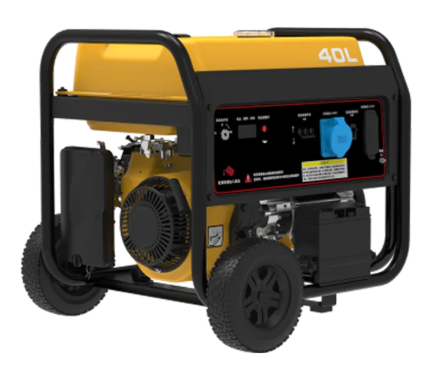Did you know that industrial facilities can waste up to 30% of their energy costs through inefficient power generation? In an era where energy efficiency directly impacts profitability and sustainability, optimizing your Diesel Generator performance is no longer optional—it's essential for maintaining competitive advantage. For plant managers, facility engineers, and operations directors, maximizing efficiency means reducing fuel consumption, lowering emissions, extending equipment life, and ultimately protecting the bottom line. This comprehensive guide reveals proven strategies and cutting-edge technologies that can transform your Diesel Generator from a necessary expense into a efficiency asset that drives operational excellence.
Understanding Diesel Generator Efficiency Metrics
Key Performance Indicators
To maximize efficiency, you must first understand how to measure it:
Fuel Consumption Rate: Liters per hour at various load levels
Specific Fuel Consumption: Grams per kWh produced
Thermal Efficiency: Percentage of fuel energy converted to electrical energy
Load Factor: Actual output versus maximum capacity
Overall Efficiency: Including parasitic losses and auxiliary systems
Industry Benchmark Standards
Modern industrial Diesel Generator systems should achieve:
40-48% thermal efficiency in prime power applications
200-220 g/kWh specific fuel consumption at optimal load
<3% voltage regulation for power quality efficiency
95% availability in well-maintained systems
Optimal Sizing and Load Management Strategies
Right-Sizing Your Generator
Oversizing costs more than you think:
25-40% higher capital investment for oversized units
15-30% increased fuel consumption at light loads
Reduced engine life due to excessive wet stacking
Higher maintenance costs from inefficient operation
Load Management Excellence
Optimal load range: 70-80% of rated capacity for best efficiency
Load sequencing: Prioritizing critical loads during operation
Power factor correction: Maintaining 0.8-0.9 PF for reduced losses
Load banking: Regular testing to prevent wet stacking and maintain efficiency
Insert load efficiency curve: "Generator Efficiency vs Load Percentage" - ALT text: diesel-generator-efficiency-load-curve-optimization
Advanced Fuel Efficiency Technologies
Modern Fuel System Innovations
Common rail injection: Precise fuel delivery with multiple injection events
Electronic control modules: Adaptive tuning based on operating conditions
Variable geometry turbocharging: Optimal airflow across load range
Advanced combustion chamber design: Improved air-fuel mixing and combustion
Fuel Quality Management
On-site fuel polishing: Maintaining fuel integrity through filtration
Additive technology: Enhancing combustion efficiency and stability
Fuel testing protocols: Regular analysis to ensure quality standards
Storage management: Preventing degradation through proper tank maintenance
Heat Recovery and Cogeneration Systems
Waste Heat Utilization
Industrial Diesel Generator systems can capture wasted heat for:
Facility heating: Using jacket water heat for space heating
Process heating: Utilizing exhaust heat for industrial processes
Absorption cooling: Converting waste heat into cooling capacity
Steam generation: Using high-temperature exhaust for steam production
Combined Heat and Power (CHP) Applications
80-90% overall efficiency in well-designed CHP systems
25-40% energy cost reduction compared to separate systems
Quick return on investment typically 2-4 years
Emissions reduction through increased overall efficiency
Preventive Maintenance for Peak Performance
Efficiency-Focused Maintenance Schedule
Daily: Visual inspections, fluid level checks, leak detection
Weekly: Air filter status, coolant concentration, general condition
Monthly: Load testing, fuel system inspection, performance verification
Annually: Comprehensive overhaul, component replacement, efficiency testing
Critical Efficiency Maintenance Tasks
Air filter maintenance: 10-15% efficiency loss from restricted airflow
Fuel injector service: Proper spray pattern essential for complete combustion
Turbocharger inspection: Ensuring optimal airflow and boost pressure
Cooling system maintenance: Proper temperature regulation for ideal combustion
Smart Monitoring and Control Solutions
Real-Time Efficiency Monitoring
Power management systems: Optimizing load distribution and generator operation
Remote monitoring platforms: Tracking performance metrics 24/7
Predictive analytics: Identifying efficiency trends and potential issues
Automated reporting: Documenting efficiency performance and improvements
Advanced Control Technologies
Automatic voltage regulation: Maintaining optimal voltage levels
Frequency control: Precise speed regulation for fuel efficiency
Load demand control: Matching generator output to actual requirements
Parallel operation control: Optimizing multi-generator systems
Partnering with a knowledgeable Diesel Generator supplier ensures access to the latest efficiency technologies and expert guidance.
Operator Training and Best Practices
Efficiency-Focused Operation
Trained operators can improve efficiency by 10-15% through:
Proper startup and shutdown procedures minimizing fuel waste
Load management awareness maintaining optimal loading
Performance monitoring identifying efficiency deviations
Preventive maintenance execution catching issues early
Continuous Improvement Culture
Regular efficiency reviews analyzing performance data
Operator feedback systems incorporating frontline insights
Efficiency benchmarking comparing against industry standards
Best practice sharing across multiple facilities
Efficiency Comparison: Diesel vs. Alternative Technologies
Cost per kWh Analysis
Diesel generators: $0.15-0.30 per kWh depending on load and fuel cost
Natural gas generators: $0.10-0.20 per kWh with stable fuel pricing
Solar with storage: $0.08-0.15 per kWh with high initial investment
Grid power: $0.08-0.20 per kWh with reliability concerns
Operational Considerations
Response time: Diesel generators provide power within seconds
Fuel storage: Diesel can be stored longer than alternative fuels
Maintenance requirements: Well-established service networks
Reliability: Proven technology with high availability rates
For facilities needing immediate solutions, many Diesel Generator supplier companies maintain Diesel Generator in stock configurations optimized for efficiency.
Implementing an Efficiency Improvement Plan
Step-by-Step Implementation
Baseline assessment measuring current efficiency metrics
Goal setting establishing realistic improvement targets
Technology evaluation identifying appropriate efficiency solutions
Implementation planning scheduling improvements with minimal disruption
Training development ensuring operational competence
Monitoring setup tracking progress and verifying results
Investment Prioritization
Quick wins: Low-cost improvements with immediate returns
Medium-term projects: 1-2 year payback efficiency investments
Long-term strategies: Major upgrades with significant efficiency gains
Continuous improvement: Ongoing optimization and maintenance
Measuring and Maintaining Efficiency Gains
Performance Tracking
Monthly efficiency reports documenting key metrics
Trend analysis identifying improvement opportunities
Benchmarking comparing against industry standards
Cost-benefit analysis validating improvement investments
Sustaining Improvements
Regular audits ensuring maintained efficiency standards
Technology updates incorporating new efficiency innovations
Training refreshers maintaining operational excellence
Continuous improvement culture embedding efficiency mindset
Insert efficiency dashboard: "Generator Performance Monitoring" - ALT text: diesel-generator-efficiency-monitoring-dashboard
Conclusion and Next Steps
Maximizing Diesel Generator efficiency in industrial settings requires a comprehensive approach combining proper equipment selection, advanced technologies, disciplined maintenance, and operational excellence. The potential rewards are substantial—reducing fuel costs by 15-25%, lowering emissions, extending equipment life, and enhancing overall operational reliability.
Remember that efficiency optimization is not a one-time project but an ongoing journey. The most successful organizations treat efficiency as a core value embedded in their operational culture, continuously seeking improvements and embracing new technologies.
Ready to Maximize Your Generator Efficiency? Our efficiency experts have helped industrial facilities achieve an average of 22% fuel savings through comprehensive optimization programs. [Contact us today for a free efficiency assessment and customized improvement plan]. Start your journey to peak efficiency and significant cost savings today.
Table of Contents
- Understanding Diesel Generator Efficiency Metrics
- Optimal Sizing and Load Management Strategies
- Advanced Fuel Efficiency Technologies
- Heat Recovery and Cogeneration Systems
- Preventive Maintenance for Peak Performance
- Smart Monitoring and Control Solutions
- Operator Training and Best Practices
- Efficiency Comparison: Diesel vs. Alternative Technologies
- Implementing an Efficiency Improvement Plan
- Measuring and Maintaining Efficiency Gains
- Conclusion and Next Steps

